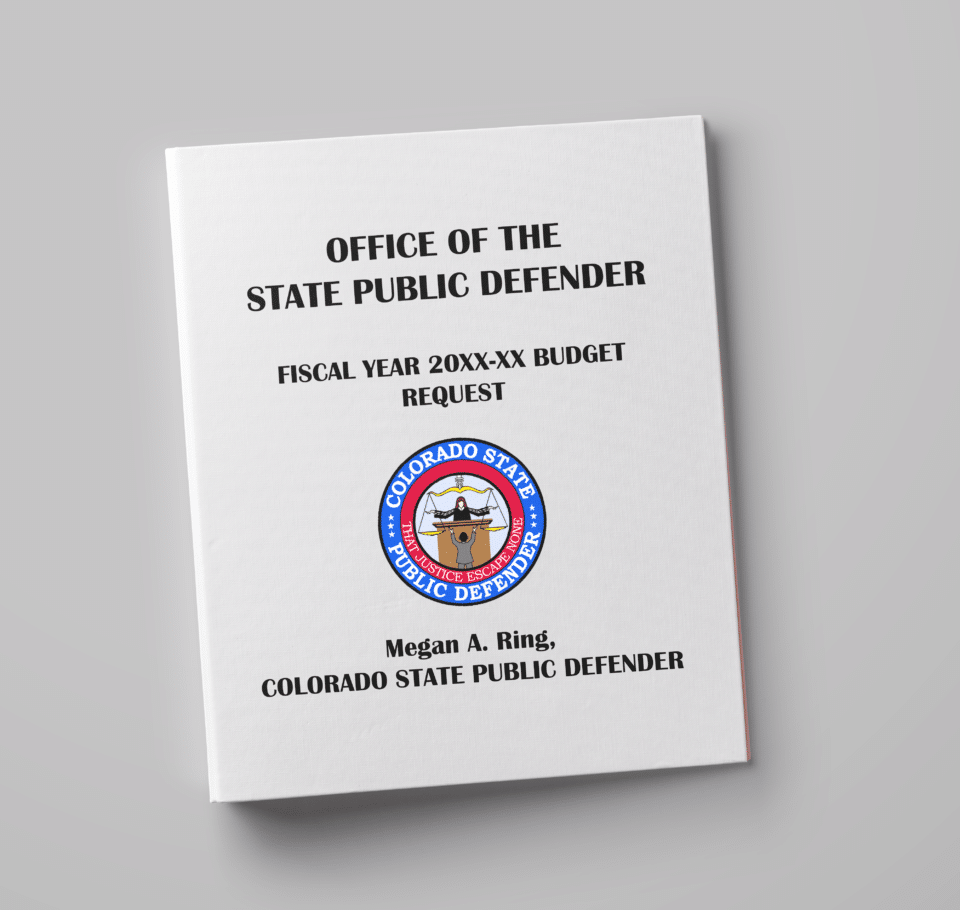Budget

Responsible Steward of State Funds
The Office of the State Public Defender (OSPD) is funded through the Colorado State Legislature in the state’s annual “Long Bill”, the funding bill for all of Colorado State government. The bill is required to pass both chambers of the Colorado legislature and signed into law by the Governor. This usually happens in during April and May of each year.
The fiscal year for Colorado State government begins on July 1. All state agency budget requests for the upcoming fiscal year must be submitted by the November 1 of the preceding year. OSPD has a long history of presenting the Joint Budget Committee with data-driven annual budget request with a focus on the many dynamic factors that are expanding defender workload.
OSPD budget is prepared and administered by the State Administrative Office. All expenses are managed and approved through this office
For more information on the budget, see the links below.
- Fiscal Year 2025-26 OSPD Budget Submission
- Fiscal Year 2024-25 OSPD Budget Submission
- Fiscal Year 2023-24 OSPD Budget Submission
- Fiscal Year 2022-23 OSPD Budget Submission
- Fiscal Year 2021-22 OSPD Budget Submission
In response to requests by certain legislators, OSPD biannually prepares and publishes a staffing and salary comparison report between OSPD and the District Attorney’s Office in all 22 Judicial Districts throughout the state.
The reports demonstrates, with data received directly from each individual office, what the staffing and salaries are for both prosecutors and defenders across Colorado.
State of Colorado's Transparency Online Project Site (TOPS)
To review actual year to date expenditures for the current fiscal year please see the State of Colorado’s Transparency Online Project Site (TOPS). This information is provided by the Colorado Operations Resource Engine (CORE).
The Budget Process
The fiscal year for Colorado State government begins on July 1. Budget requests for the fiscal year must be submitted on the November 1 of the year before the agency receives the sought funds.
Budget Formulation Phases
July Through October – Finalizing Budget Recommendations
OSPD staff work to finalize budget recommendations which are presented to the legislature and specifically the Joint Budget Committee (JBC) for its consideration and approval for the next fiscal year. OSPD works closely with its JBC analyst to describe the needs of the agency and arrive at a focused, data supported and responsible request each year.
November Through January – JBC Briefings and Hearings
Between November and January, JBC staff analysts prepare and present briefings on the agency’s budget request. During these briefings, the JBC may ask their staff to prepare a list of questions regarding the OSPD budget.
Approximately one to two weeks after a briefing, the JBC will hold a hearing with the OSPD Leadership. Hearings are the primary time that the OSPD can publicly and directly respond to JBC questions asked during the briefing.
January Through March – Figure Setting
The JBC figure setting process begins in late January and concludes into March. Through this process, the JBC Staff makes recommendations on each budgetary line item as well as for any new request(s). The figure setting process is when the JBC votes on the appropriations that will be included in the Long Bill for the upcoming fiscal year.
March Through May – Long Bill Legislative Process
Members of the General Assembly review the budget package and proposed amendments. Within each chamber, the Appropriations Committee is the Committee of Reference for the Budget. At the Committee of Reference meeting in the first chamber, public testimony is taken. At the Committee of Reference meeting in the second chamber, the committee typically removes any amendments put on in the first chamber and proposes either the same ones or new amendments.
Once the Long Bill package has moved through the Committee of Reference, the respective caucuses meet to review the budget and potential amendments in advance of hearing the Long Bill package on Second Reading. Once each chamber has heard and voted on the Long Bill and any orbital bills, for any bills which have amendments that don’t align across the two chambers, the JBC acts as the conference committee to reconcile any differences between the two versions of the bill.
Upon final passage of the Long Bill, it goes to the Governor for signature. The Governor has 10 days during the session to veto any portion of the Long Bill.
